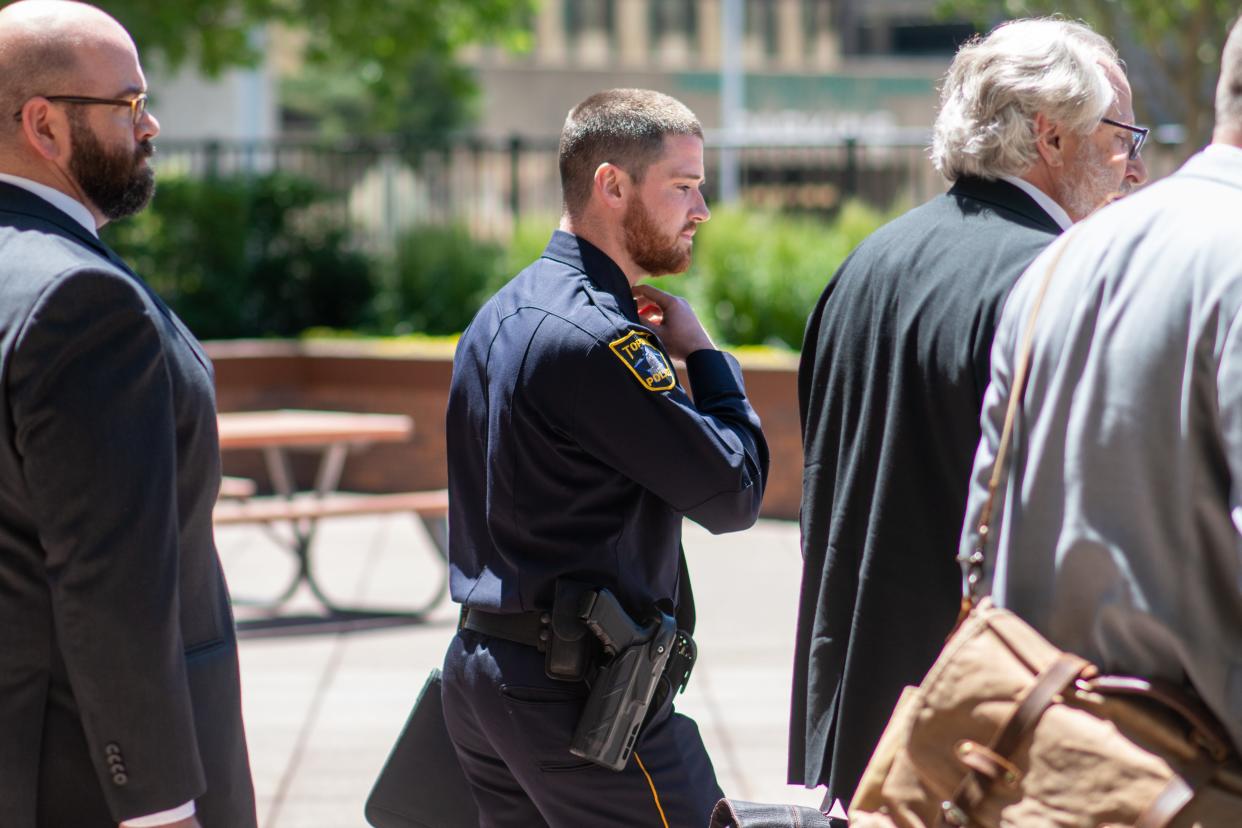A man sued a Topeka police officer and lost. A judge ordered the man to pay the officer's expenses.

Topekan Timothy Harris has been ordered to pay expenses incurred by Chris Janes, the Topeka police officer he sued unsuccessfully in federal court while alleging excessive use of force.
U.S. District Judge Dan Crabtree issued an order late Thursday afternoon requiring Harris to cover Janes' costs, including attorney fees, after a jury ruled against Harris. Harris had sued Janes for $1 million plus his own expenses.
"The court orders that plaintiff recovers nothing, the action is dismissed on the merits, and defendant Christopher Janes recover costs from plaintiff," the order said.
It wasn't immediately clear how much those costs would entail.
The most recent court document available, submitted in mid-January, put Janes' expenses at $37,688.05. Harris' expenses were listed then as $197,120.55.
Jurors deliberated about two and a half hours
A federal court jury ruled early Thursday afternoon that Janes didn't violate the Constitutional rights of Harris, 38, who suffered a broken jaw when he arrested him in January 2018 in East Topeka.
Jurors deliberated about two and a half hours before reaching a unanimous verdict in the use of force lawsuit that Harris, who is Black, had been pursuing against Janes, who is white and has been a Topeka police officer since 2016.

"The city is pleased with the jury's verdict," Topeka city attorney Amanda Stanley told reporters after it was rendered at the federal courthouse in Topeka.
She said jurors realized “what the city has known all along,” that the amount of force Janes used wasn't excessive given the circumstances involved.
"The plaintiff has the opportunity to appeal, and as such, the City will not comment further on the matter," Stanley said.
Harris alleged that Janes violated his Constitutional rights by beating him and breaking his jaw while his hands were cuffed behind his back in January 2018 in East Topeka.
City said Timothy Harris grabbed officer's duty belt
This week's proceedings included multiple showings of video of the incident from a body camera Janes was wearing at the time.
Topeka police said Harris and Janes got into an altercation near S.E. 10th and Golden Avenue as Janes sought to investigate a complaint he'd taken earlier that day that Harris had stolen property from Harris’ former girlfriend.
Janes learned after receiving that complaint that Harris was wanted on an outstanding warrant charging him with violating conditions of probation, which was imposed after he was convicted of possessing drug paraphernalia and interfering with law enforcement.
Harris was consequently most likely going to jail once police found him, Janes testified Wednesday at the lawsuit trial.
He said he was patrolling the area to which he was assigned shortly after 7 p.m. the day he took the complaint when he saw Harris in the driver's seat of a car parked illegally facing the wrong way in the street near Harris’ home.
Janes said he turned on his patrol's car's emergency lights and Harris got out of the car he was in, then got back in after Janes twice ordered him to do so.
Janes' body camera video shows Harris sitting in the driver's seat of the stopped car as Janes approaches.
The video shows Janes, Harris and a woman in the passenger's seat exchanging words about the alleged theft and the parking issue.
After Janes tells Harris he's being detained, Harris takes off his jacket while sitting in the front seat of the car, throws down the cigarette he’s been smoking and gets out of the car.
Janes puts his hands on Harris' chest, tries unsuccessfully to guide him back into the car and tells Harris he hadn't given him permission to get out. Janes then cuffs Harris' hands behind his back.
One of Harris' attorneys, Carlton Odin, of Chicago-based Action Injury Law Group, LLC, said Janes caused the encounter to escalate by losing his temper after Harris then asked him, "Are you happy now?"
But one of Janes' attorneys, Allen Glendenning, of Great Bend-based Watkins Calcara, Chartered, said Harris had already caused the incident to escalate at that point by resisting physically after he got out of the car and Janes tried unsuccessfully to guide him back into it.
Janes was then trying to walk Harris to his patrol car when Harris struggled and grabbed the duty belt of Janes, who then took him to the ground, with Harris falling harder than Janes had intended, Glendenning said.
"The officer then placed Harris on the ground for better control until additional officers arrived," Topeka's city government said in a statement issued in September 2018. "While on the ground, Harris again grabbed the officer’s duty belt. In response, the officer used two fist strikes to Harris’s torso and applied pepper spray to his face."
U.S. District Senior Judge Sam Crow ruled in August 2019 that a reasonable jury could conclude Janes violated Harris' Fourth Amendment rights due to the amount of force he used on Harris as his hands were cuffed behind his back and he wasn't resisting.
He wrote that Janes should have known that “It was unconstitutional to take down the arrestee face-first, to apply knee pressure to his back, to punch him in the face, and to pepper spray him when the arrestee is restrained by handcuffs, is cooperating by walking to the patrol car and is not resisting."
But Glendenning told jurors in his opening statement Tuesday that this week they would hear, as the late radio commentator Paul Harvey called it, "the rest of the story."
Officer says Harris displayed 'pre-attack indicators'
Janes testified that Harris displayed at least eight "pre-attack indicators" that set off alarm bells for Janes suggesting Harris was about to attack Janes or try to escape.
He said those included taking off his jacket on a 30-degree evening, apparently to give himself more freedom of mobility; getting out of the car he was in without permission; and tensing up as he was being cuffed behind his back to test his strength against that of Janes.
Glendenning asked jurors during Thursday's closing arguments to pay special attention to testimony given Wednesday by Sgt. Ruben Salamanca, assistant director of the Topeka Police Academy.
He noted that Salamanca had testified that the actions Janes took were consistent with those that would be taken by a reasonable police officer.
Glendenning stressed that Harris’ attorneys had not provided any alternative versions of what would be considered reasonable police conduct in the situation involved.
Jury instructions allowed for officers to make 'honest mistake'
Instructions given to jurors Thursday morning called for them to take into account "whether a reasonable officer on the scene without the benefit of hindsight would have used that much force under similar circumstances," Glendenning stressed to the jury.
Those instructions give officers the latitude to make an "honest mistake" regarding the amount of force needed, he said.
"An officer can act reasonably without using the least amount of force necessary, so long as the amount of force used was not excessive," those instructions said. "And, if an officer reasonably but mistakenly believed that a suspect was likely to fight back, the officer would be justified in using more force than in fact was needed."
Timothy Harris said he feared he was going to die
Harris testified Wednesday that after Janes punched and pepper sprayed him, a mixture of blood and pepper spray inside his mouth left him unable to breathe.
He said he feared he was going to die and was begging for his life.
Harris said he subsequently endured excruciating pain as his jaw was wired shut and he had to subsist on chicken and beef broth for two months. Harris now has a metal plate in his face, jurors were told.
Numbness from the injury still causes him to drool and affects how he eats, Harris said.
Harris initially sued both Janes and Topeka's city government, claiming its police training and supervision policies were the moving force behind the alleged violations of his Constitutional rights.
The count against the city was subsequently dismissed, though the city continued to help with the defense of Janes, who is now a Topeka police K-9 officer.
The three-man, five-woman jury that heard the case appeared to be all white. Its members said they hadn't previously heard anything about the case.
Jurors finished hearing testimony early Wednesday afternoon, after Harris' attorneys put forth two witnesses and Janes' attorneys put forth three.
Harris and Janes each spent about two hours on the witness stand.
National debate about police reform discussed in closing remarks
Both attorneys during closing arguments made reference to the ongoing nationwide debate regarding police reform.
Odin said that if Janes' behavior was an example of what's happening on the national stage, "It should be called that."
Glendenning disagreed, saying this week's trial wasn't an appropriate forum to take into account the nationwide police reform debate.
It "not fair to dump it on Officer Janes' head," he said.
Tim Hrenchir can be reached at threnchir@gannett.com or 785-213-5934.
This article originally appeared on Topeka Capital-Journal: Timothy Harris must pay costs of Chris Janes, police officer he sued

